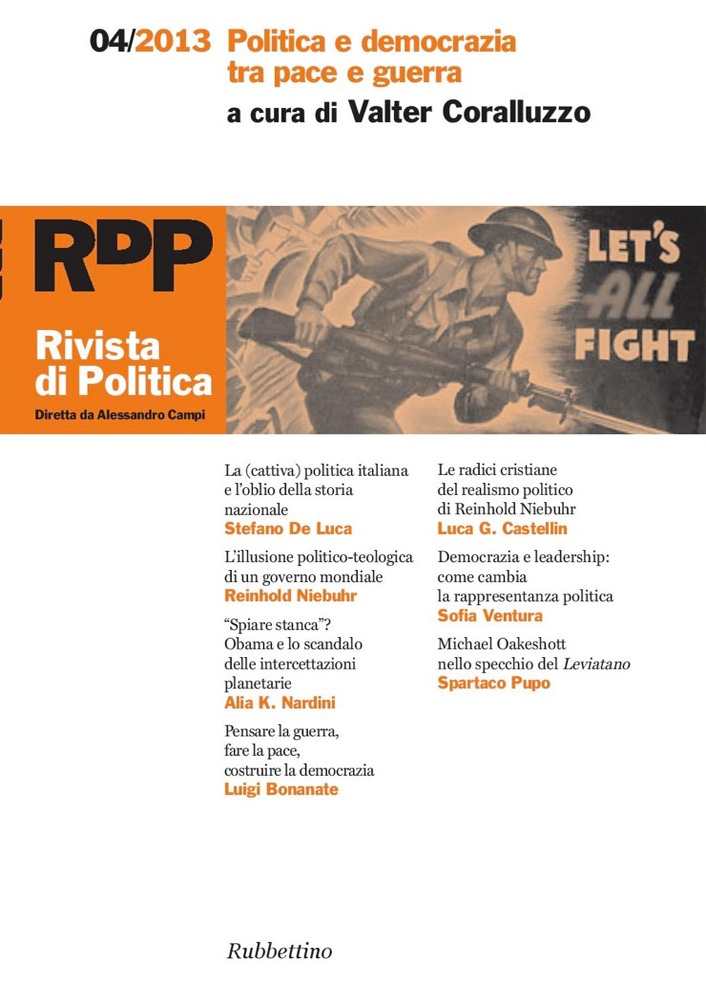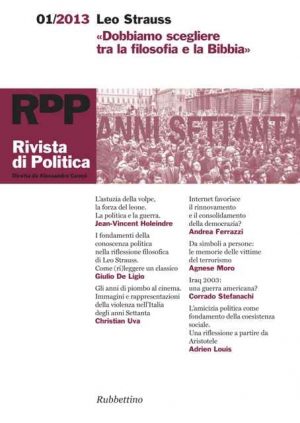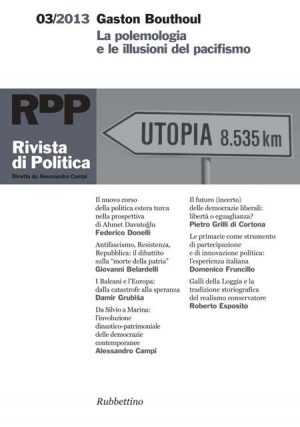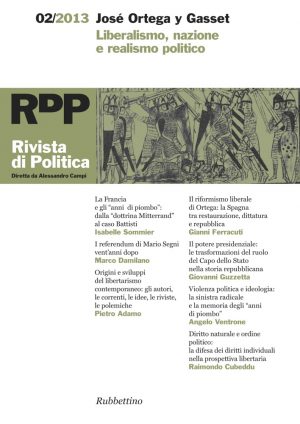04/2013 – Politica e democrazia tra pace e guerra. A cura di Valter Coralluzzo
ISSN: 2037-495X
8,50€ – 11,00€
Descrizione
Sommario:
congetture e confutazioni
Furori rivoluzionari: il Movimento 5 stelle e i sanculotti Cesare Vetter
(Ri)pensare l’Italia. La politica nello specchio della storia Stefano De Luca
Il centenario della Grande guerra e la difficile identità italiana Leonardo Varasano
Senza vie d’uscita? I limiti strutturali delle politiche democratiche Giovanni Belardelli
Germania, Europa. La questione tedesca e la sfida dell’unità europea Riccardo Cavallo
Datagate: nuove tecnologie, nuovi problemi Alia K. Nardini
Guerra e democrazia
Politica e democrazia tra pace e guerra
Guerra e democrazia: uno sguardo d’insieme Valter Coralluzzo
La pace tra guerra e democrazia Luigi Bonanate
La guerra e i suoi morti: la porta stretta delle democrazie Cinzia Rita Gaza
L’ipnosi del simbolo e la giustificazione della guerra Massimo Chiais
Il citizen da soldato a spettatore: la recente filmografia di guerra americana Paolo Ceola
l’inedito
Il realismo (politico) cristiano di Reinhold Niebuhr
Un realismo domato. Cristianesimo e politica nel pensiero di Reinhold Niebuhr Luca G. Castellin
L’illusione del governo mondiale Reinhold Niebuhr
La natura dell’uomo e le sue comunità. Uno studio critico delle teorie politiche realiste e idealiste Reinhold Niebuhr
Teoria politica
Thomas Hobbes e l’individualismo moderno. Il Leviatano secondo Michael Oakeshott Spartaco Pupo
La democrazia contemporanea e la scelta diretta dei governanti Sofia Ventura
Abstracts
Luca G. Castellin, A Tamed Realism. Christianity and Politics in Reinhold Niebuhr’s Thought
During the twentieth century the protestant theologian Reinhold Niebuhr was an important public intellectual. From the Thirties until the Sixties he wrote numerous historical, theological and political works, and was a tireless polemicist and animator of some journals. Not only has he influenced the development of American politics but also he has inspired the reflections of some authors of classical realism in IR. This essay analyses the inextricable and fertile relationship between politics and religion in Niebuhr’s theory. Rejecting both sentimental idealism and cynical realism he argued a “Christian realism” in which the legacy of St. Augustine’s thought was strong. Through his tamed realism, that was based on the Christian view of human nature and history, Niebuhr analysed and judged national and international politics of the United States. In this way, he offered a prophetic world order vision that is probably still valid today.
Reinhold Niebuhr, The Illusion of World Government
In this article, originally published on «Foreign Affairs» in 1949, Reinhold Niebuhr argued a tough criticism against some scholars and politicians that have suggested the possibility of World Government. Though technics have established a rudimentary world community, they have not integrated the international system organically, morally or politically. Niebuhr thinks that every community needs a rooted social tissue, while the anarchical international system lacks it. Indeed the forces – as the mutual fear of nuclear annihilation and the increasing economic interdependence – which were operating to integrate the world community, were limited. According to the protestant theologian, there is no viable constitutional solution to the problem of international order. To achieve peace and justice in the world community states can only go beyond their national interest.
Reinhold Niebuhr, Man’s Nature and His Communities. A Critical Survey of Idealist and Realist Political Theories
In his last work, entitled Man’s Nature and His Communities (1965), Reinhold Niebuhr offered a retrospective view of his intellectual experience. This essay is the central and namesake chapter of the book in which he proposed a critical survey of idealist and realist political theories. From ancient Greek philosophers, like Aristotle and Plato, until some contemporary thinkers, such as Marx and Freud, Niebuhr analysed the different interpretation of human nature in western political thought. He also studied the crucial role of Christian authors and modern ones in the development of political and social institutions of Europe. Through this long and original review in which the desire to find a valid synthesis between realism and idealism is clear, he proposed again his unique interpretation of politics.
Valter Coralluzzo, War and Democracy: An Overview
Poised between peace, war and terrorism, democracies are called upon to deal with many issues critical to their future. The article discusses some of these issues, providing an overview of the prospects of peace and democracy in the post-Cold War era. Notably, the aim of the article is twofold. On the one hand, it focuses on an issue of cardinal theoretical and practical significance: is war declining? First, the author takes into account the thesis of the obsolescence of major war and the thesis that we live in the most peaceful period in human history, and then, relying on the Uppsala Conflict Data Program, updated to 2011, he analyzes recent trends in armed conflicts and wars (i.e. conflicts with over 1,000 battle-related deaths). The author also discusses the “new wars”, as well as humanitarian intervention and post-heroic warfare. On the other hand, the article reviews the recent debate on the democratic peace hypothesis (democracies do not go to war with each other), which has become a topical issue in international relations research in the past three decades. The article ends by showing, on the basis of data from Freedom House, that in recent years there has been a significant increase of democratization, although the issue of enlargement of democracy remains controversial.
Luigi Bonanate, Peace between War and Democracy
Is there a (essentially unbreakable) link between democracy and peace? What is the relationship between states and their warlike nature? Going back to the Kantian notion that democratic states are never bellicose, in 1983 an American scholar, Michael Doyle, announced to the world his discovery: Kant was right, so much so that democratic states – from the moment countries ruled democratically have been analyzed – have never fought one another. Since then, around the thesis of the so-called pax democratica (according to which since democratic states do not fight one another, then if all countries were democratic, war would disappear) has developed among scholars of international relations (though not only them), a lively debate. This article analyzes its main theoretical and practical implications.
Paolo Ceola, The Citizen from Soldier to Spectator: The recent American War Filmography
To try and grasp any aspect of the twentieth century, it is necessary to take into account the language of cinema. This is all the truer when what is placed under the magnifying glass is the war. Rather than taking into account the ways in which films speak of the war, this article tries to do the opposite, that is, it tries to shed light on how the intimate nature of war reveals itself through the language of cinema. Here, a crucial aspect is, for example, the relationship between war and democracy. In particular, the problem that interests us (and which will be analyzed taking into consideration the recent American war filmography) is the evolution of the notion of ‘democratic soldier’, or rather the involution of the citizen-soldier from a subject endowed with his own values, even in the folly of war, to a mere spectator devoid of any historical subjectivity.
Massimo Chiais, The Hypnosis of the Symbol and the Justification of the War
What is it that keeps driving, even today, the human being, especially if a peaceful citizen living within a democracy, to accept what might seem rationally inconceivable to anyone: to risk his life and that of his fellow men in the name of ‘values’ and ‘ideals’ so powerful as to endow death in combat and the killing of the ‘enemy’ with an heroic aura? In wartime, the psychological and social representation of conflict conveyed by the many ‘consensus factories’, overlapping reality, causes the public to accept and justify behaviors and feelings generally execrated in time of peace. What role does the mythical-symbolic and ritual dimension play in this process?
Cinzia Rita Gaza, The War and its Dead: The Narrow Ggate of Democracies
In the face of war, the ethical and political dilemma of democracies has now been enriched by a new, disruptive element of crisis, represented by a growing social intolerance towards the sacrifice of human lives in war. Here, then, we shall talk about democracy, war, and death and their complex relationship. In particular, this article examines the bilateral relations between the elements of this unusual ménage à trois – democracy and war, war and death, death in war and democracy – to try to understand whether the molecular bonds that hold them together are sufficiently solid to ensure the stability of the relationship.
Spartaco Pupo, Thomas Hobbes and the Modern Individualism. The Leviathan in Michael Oakeshott’s Interpretation
This paper provides an overview of the Oakeshott’s understanding of the Hobbes’s political philosophy, that is almost entirely unknown in Italy. Oakeshott refutes the characterization of Hobbes as absolutist and emphasizes his idea of authority as more compatible with the individual liberty than the classical notion of reason. In the secondary literature about Hobbes, Oakeshott’s interpretation shows its originality even in comparison with other important studies in XX century, especially those of Leo Strauss, Hannah Arendt and Carl Schmitt. The paper concludes that Hobbes’s individualism is based on a skeptical and antirationalistic vision of politics, that is also the Oakeshott political philosophy’s theoretical groundwork.
Sofia Ventura, Contemporary Democracy and the Direct Choice of Rulers
Political leaders have always played a crucial role in mass democracies, as we know from the famous Max Weber’s writing, Politics as a Vocation. Nevertheless, during the last decades, the functions they perform have considerably changed. Some phenomena, generally labelled as presidenzialisation of politics or public democracy, concerning a large array of political, institutional, economical, technological and social transformations, have taken place in Western societies. They have reinforced the link between leaders and citizens (the public) at the expense of the traditional intermediate agencies, as – first of all – political parties. Such developments have challenged both parties, which, in order to maintain a role in the political system, have been forced to rethink their goals and organizational models, and the conception itself of the working of liberal democracies (in particular the parliamentary ones), and opened the way to a large and often critical debate and, at the same time, at the political level, many and different efforts to manage, constrain or further develop these new trends.






